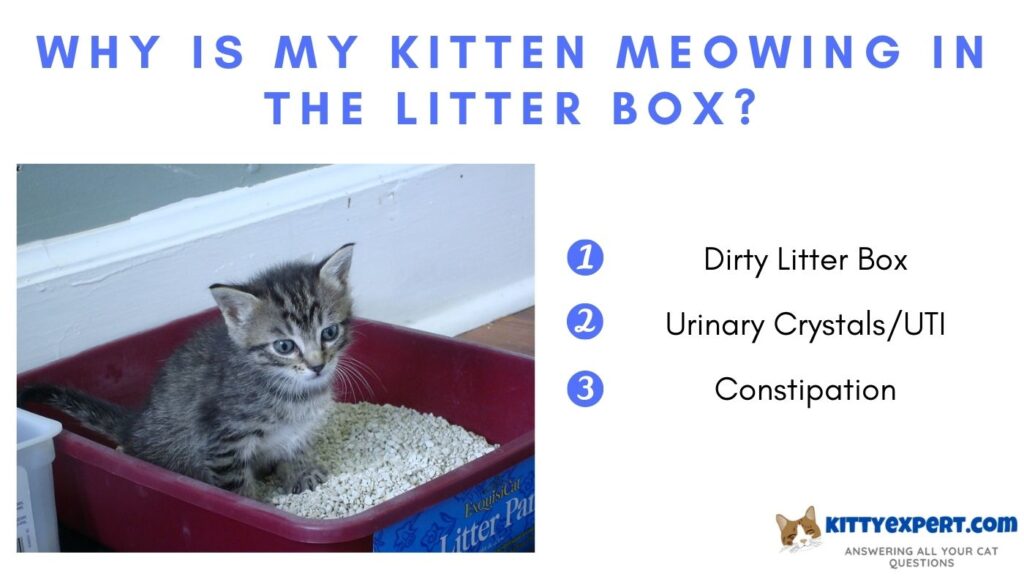Meowing is a standard method of communication for cats to let us know how they are feeling. Usually, they meow when they want attention or if they feel anxious or hungry. They may also meow to complain to their respective owners.
Why is My Kitten Meowing in the Litter Box?
The 3 main reasons why your kitten is meowing in the litter box is because it’s dirty, your kitten has urinary crystals, or they are constipated.
Dirty Litter Box
We live busy lives, and understandably, we may forget to clean up our pet’s litter boxes. Regardless, this could be why they keep making sounds to indicate that their litter box needs to be cleaned for them to do their business. Cats are picky and sensitive about certain fragrances, hence wanting a clean place to litter.
It is important to change your cat’s litter about every two weeks. You should also make sure to scoop out any waste daily.
If you kitten starts meowing in the litter box, it could mean your kitten is experiencing pain during urination and defecation. This could be a result of urinary crystals or a UTI. It could also be a sign that your kitten is constipated.
Urinary Crystals in Kittens
Urinary crystals occur when there is a significant increase in the concentration of minerals in a cats body, such as magnesium, ammonia, calcium oxalate and phosphate. Therefore the urine becomes too acidic, and these ‘crystals’ begin to scrape at the urethra. The gashing of the urethra causes immense pain during urination and, if left untreated, could lead to bladder stones. Urinary crystals are commonly caused by having an unhealthy diet of acidic foods and poor water consumption.
The symptoms that indicate your cat is suffering from urinary crystals are:
- Excessive crying during urination
- Inability to urinate in the litter box
- Strained peeing
- Lack of appetite
- Bloody urine
- Pooping in the house all of a sudden
Suppose a kitten is suffering from an inflamed bladder. In that case, these swollen tissues are due to a bacterial infection, which antibiotics can treat through a prescription from the local veterinarian. Your cat might also be suffering from a urinary tract infection (UTI).
With that being said, to prevent urinary crystals, it is crucial to watch over our pets’ diet and ensure they are consuming healthy foods. In addition, monitor their behaviours when they use their litter boxes and see if any unusual crying persists.
You should consult a veterinarian if you suspect your kitten has urinary crystals. They will perform a medical examination and prescribe the proper medication to get rid of the crystals. Furthermore, vets may also provide a prescription diet with specific composed food designed to dissolve the stones in a kitten’s stomach within 1-2 months. If you suspect diet could be the cause, check out my article on the best non-prescription cat food for urinary crystals.
In some extreme cases, surgery might be required to remove the crystals.
Constipation
Another health condition that could be causing a kitten’s excessive meowing is constipation. If your kitten is struggling to poop, typically, they will cry out in pain due to the uncomfortable feeling that comes with constipation. One of the main reasons why this occurs is due to dehydration.
When kittens don’t get enough water, their stool becomes hardened, making it difficult for a bowel movement to push out the poop. It is common for kitten poop to smell bad; however, if the scent starts to have a particular smell that feels odd from the norm, you should monitor your cat’s stools.
It is vital to note that healthy poop is usually soft and shaped like clay.
Conclusion
Kittens repeatedly crying while using their litter box is a vital indication of pain that requires medical attention. As mentioned above, this could be caused by urinary crystals or constipation.
How to tell if your cat poop is unhealthy:
- Darker poop could mean the presence of blood in the stool.
- Liquid stools indicate constipation.
- If your cat’s poop is too light, possibly because their duct is blocked.
- If the poop is shaped like a small hardball.
There are other reasons why your kitten is crying in the litterbox, such as stress disorders or behavioral issues, and all of these underlying health conditions can lead to severe outcomes. Therefore, it is crucial that, as pet owners, we take on the responsibility to inform our local vets if any of these symptoms or signs persist in our animals.
Vets will pinpoint the exact condition causing pain to our kittens and provide the right guide for treatment. In the meantime, keeping a close watch on our beloved pets and our habits can help us identify the signs before it’s too late.

